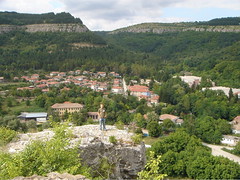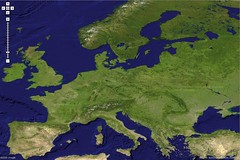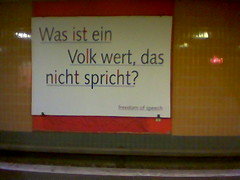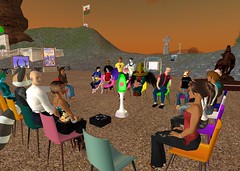skip to main |
skip to sidebar
"Do you think the Internet makes the world smaller", a friend of mine asked while we were returning to our apartment after a night in Ohrid, Macedonia. "Yes - and then strongly NO", I answered. My two weeks of holidays in Bulgaria and Macedonia can be used as evidence.
I could glance through dozens and dozens of sites about the wonders of Macedonia and about the catastrophic earthquake of Skopje in 1963 but that would never live up to the experience of hearing from my friend's parents how their house shook for over twenty seconds and how they slept weeks in a tent. In the same way I had read several articles about the changing labour market of Bulgaria but it could never compete with our taxi driver in Sofia who turned to us and said:"I am 53 years old. I am an intelligent taxi driver with three degrees. There is nothing for me in this country."
It is really difficult to define what I thought of these two countries before travelling. I could maybe mention terms such as conflict, war, EU accession and yoghurt. After meeting people and travelling across the countries I would say untouched nature, fresh salads and garlic, glorious history, religion and kind and humble people. I am not claiming that I know what these countries are about but I know much more about the challenges of Macedonia to create a common identity among the Macedonians and the Albanians. I was also amazed by the way urbanisation can be seen in these countries: the untouched mountains and forests and the grannies of the small villages collides with the chaotic traffic and with the lack of urban planning vision of the capitals. I guess my two souvernirs can be used well as evidence of my way of seeing these countries: two photographs of smiling grannies and a bottle of mastika (Macedonian ouzo) donated by my friend's father.
I want to go back. At the same time I realise clearly how fortunate I am to be able to travel freely and visit friends all across the continent.
Clever quote of the day (which is in no way connected but I still need to share it):
"Another retrogressive aspect of the modesty movement is its disconcerting message that women are responsible for men's behaviour. The notion of dressing modestly comes at least partly from the idea that men can't control themselves; by telling women that they have to dress a certain way to quell men's desires, modesty advocates are sending a clear message that the onus is on us to control men's sexual - and possibly violent - actions."
- Jessica Valenti:"Chastity is chic" in todays Guardian.
Could not agree with her more.
This is a short post from Ohrid in Macedonia. I just need to share few wonderful things:
1. Swimming in lakes - during this holiday both in Finland and Macedonia.
2. Shopska salad - cucumber, tomato, onion, olives, white cheese (sort of feta), vinegar, olive oil. It rocks when the ingredients are good.
3. One month holiday - 2 weeks in never enough for forgetting work.
4. Good friends - a friend of mine proved once again that a bus trip of five and a half hours is a blast in a good company.
5. Istanbul - I cannot wait to get there in a month. In the mean time I am preparing myself by reading Orhan Pamuk's short story collection Istanbul.
More later. Now time for food.
I don't know whether it is the holiday mood or what but this morning's glance to the newspapers gave me a sense of hope. It is a brilliant thing to realise that my remark yesterday about lack of will to intervene is at least slightly misplaced.
The biggest reason for joy was Bush's and Merkel's press conference yesterday. The leaders criticised Russia with clear words. Bush advised Putin to leave the scaremongering and said that it is Russia's own benefit that they would share the same values - such as freedom of the press - as the United States and Germany. Merkel said that a wide range of opinions supports the stability of a country. Although I know that the US is not the number 1 country in the world when it comes to press freedom, I would still congratulate Bush for his courage this time.
The other piece of news that made me extremely happy were the latest comments of my former professor, Commissioner Olli Rehn. I have always seen Rehn as a man with clear values and courage to act and therefore being highly approachable and also excellent to deal with delicate issues such as the EU enlargement. Rehn is one of the best lecturers I had during my studies. He was also very attentive and made an impression when he asked last year in a conference how my thesis was proceeding and even remembered the subject. This was when he was already a member of the European Commission.
In the article Rehn commented on the future of the enlargement negotiations. In addition to many brilliant remarks, he said one of the wisest sentences I have heard from a European politician for a while. At the same time when he is extremely strict on the membership criteria, he is still a firm believer on the idea of enlargement. Rehn said:"There is no point in drawing the border of the European Union with a wide marker when we just got rid of the Iron Curtain."
Speaking of enlargement, I will be travelling during the next two weeks to two of the candidate countries. I am having my holidays with a dear Finnish friend of mine in Bulgaria and Macedonia. I must admit that I have no idea what to expect.
This post is not about the hit of No Doubt. I just read from the Dutch higher education portal ScienceGuide that the Chair of the Dutch National Union of Students LSVb was put in jail for a few days and she was not allowed to enter Russia. The reason is that she is part of the Mission to Minsk campaign which criticises strongly the Belarusian government.
After that I read from the Finnish daily Helsingin Sanomat that Putin has said that he is not going to listen to lecturing about democracy in the upcoming G8 Summit in Russia. He has blaimed the critics for colonialism. "If you look at newspapers hundred years back you can see how at that time colonial powers justified their politics in Africa and Asia. They talked about their civilising role, the duty of the white man. If you now change the word civilisation to democracy, you can find the same logic and and you are able to read the same things from newspapers. There are differences between countries and forgetting that is dangerous", Putin said.
Although he was not speaking about this concrete case, I find it being extreme cowardism if the EU - boasting normally with its "European values of human rights, freedom of speech and tolerance" - is not going to say a word. But the most awful thing is that I am not too optimistic.
I am sitting in a bus on my way to Helsinki when writing this. I am returning from a visit to my oldest friend and his wife and their superb kids. They live in a smaller city outside Helsinki in a beautiful house with a garden. We had dinner, talked about the state of the world (really, we did) and observed a hedgehog crossing the yard. We could hear only the birds, an occasional car and neighbour's loud children.
As I got on the bus I opened my laptop to write one short work text. I decided to play one of my favourite songs in life, Baz Luhrmann’s Everybody’s Free (To Wear Sunscreen). I listen to this song at least twice a month because its instructions for life just rock. Somehow, after being on holiday for a week and meeting my family and all, the following part of the lyrics totally hit me. Yes, this is what it is all about.
”Get to know your parents. You never know when they will be gone for good. Be nice to your siblings. They are the best link to your past and most likely to stick with you in the future. Understand that friends come and go. But with the precious few, you should hold on. Work hard to bridge the gaps in geography and lifestyle. Cos the older you get, the more you need the people who knew you when you were young.”
Discussion between an Austrian (A) and a Finn (F) in a local train:
F:"So how was the presidency in Austria?"
A:"Well, it was really seen as part of the cabinet promoting their own thing. And because the cabinet is not very popular, the presidency was more like what-ever."
F:"Oh, for us it is seen as a national project. Everyone is SOO proud. It's like back to the good old times of the nation state."
And the point was proven in two minutes. A drunken guy started promoting the country to our group loudly.
"Where are you people from? Welcome to Finland!"
Hyvinkää is not such a bad place after all. I just returned from the Young Active Citizenships Conference which was part of the official programme of the Finnish EU presidency. I was asked to facilitate a youth training and present theoneminutesjr programme.
The venue – Rantasipi hotel in the middle of a forest - was brilliant. I find it a bold and correct move to organise a meeting such as this (bringing together youth organisations, policy makers and administrators) far away from the centre of Helsinki. This decision can be praised for two reasons:
1. A small city such as Hyvinkää is so proud of having an EU meeting. The locals were totally amazed by the exotic foreigners in the bars.
2. People stick together and do not get separated.
There was a lot of frustration in the air during the meeting. Several youth representatives felt that they were being patronised and that the goals of the meeting were not clear. At the same time some of the people coming from local and national level experienced a certain level of resentment towards the people from the European youth lobby organisations and with their carefully thought agendas. I saw some youth delegates raising their eyebrows when a youth lobbyist was all excited about structured dialogue with the Commission. This setting posed the risk that all youth participants would have left the meeting with some frustration – although for completely opposite reasons.
The question of youth representation is always problematic. At the same time I recognise the need for European youth platforms but I also find it artificial to think that the chair of a European platform organisation could play the role of The Voice Of European Youth. I am not saying that he/she would be doing this. I think it is actually something that several politicians and administrators would often fancy, i.e. having one clear partner to talk to. When they get contradictory messages from the youth delegates, it gets tricky.
In the closing session we discussed the conclusions of this meeting. The topic of the meeting was active citizenships, stressing the need to recognise also the social, cultural and economic citizenships. Due to the composition of youth in the meeting the political citizenship was highly overemphasised. There was a surprisingly strong lobby for more funding for European platforms and action proposals for increasing the voting rates. This is not to blame the people in the meeting but it is only an example of the complexity of listening to youth. Everyone seemed to recognise the need to give more visibility to the idea of several citizenships but when we got into discussion on the actions, more than 90 % of the proposals were about voting and increasing memberships in traditional youth organisations.
One of the key problems in youth representation is the relationship between power and responsibility. A lot of the people in the meeting were calling for more power but at the same time there was no accountability considering the proposals put forward. As one of the facilitators pointed out, there were a lot of complaints by youth representatives that they were not being heard and it was usually the loudest people of the meeting (who got several amendments through) putting this complaint across.
Tricky, ain't it?


















